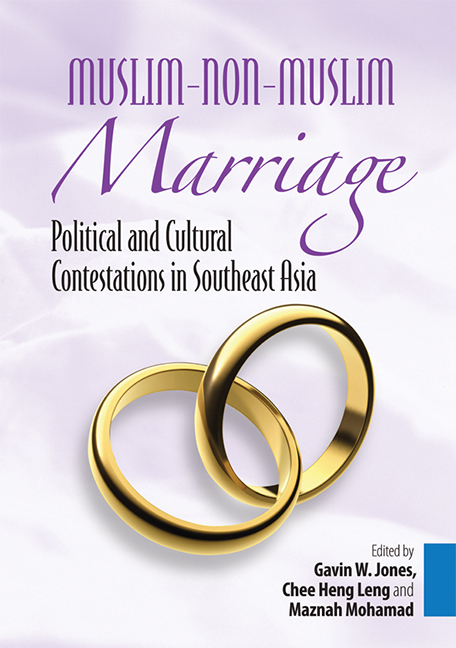Preface
Published online by Cambridge University Press: 21 October 2015
Summary
Among the many changes sweeping Southeast Asia, trends in marriage are prominent. These include delayed marriage and increased non-marriage, and new developments in marriage across boundaries of various kinds — including the boundaries of nation states, of ethnic groups and of different religions. In September 2006, the research cluster on the changing family in Asia of the Asia Research Institute, National University of Singapore held a conference on “International Marriage, Rights and the State in Southeast and East Asia”, followed by a one-day workshop on “Muslim-non-Muslim Marriage, Rights and the State in Southeast Asia”. This workshop brought together researchers working on Indonesia, Malaysia, Thailand and Singapore to examine various legal, political and cultural aspects of marriage across religious boundaries — specifically marriages between Muslims and non-Muslims. In order to bring the papers from this workshop to a wider audience, revised versions of a selection of papers, supplemented by one additional paper, were prepared for publication in this book.
Although the book covers a good deal of ground, it is farfrom comprehensive. For example, there is no separate chapter on the Philippines. However, it is our hope that the book will open up this rather sensitive topic for wider discussion. Wider discussion is much needed, because it is clear that in a globalizing world, the frequency of cases where Muslims and non-Muslims wish to marry is likely to increase, whereas the legal situation relating to such marriages in Southeast Asia is confused and unsatisfactory.
Our thanks go to the chapter authors, who have been cooperative in following up our requests for revision. We would also like to thank Saharah Abubakar, who has provided excellent assistance in the editing of the manuscript. Finally, our thanks go to the Institute of Southeast Asian Studies, especially Mrs Triena Ong, Head of the Publications Unit, for accepting the manuscript and seeing it through to timely publication.
- Type
- Chapter
- Information
- Muslim-Non-Muslim MarriagePolitical and Cultural Contestations in Southeast Asia, pp. vii - viiiPublisher: ISEAS–Yusof Ishak InstitutePrint publication year: 2009

